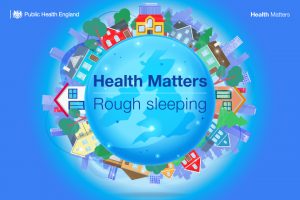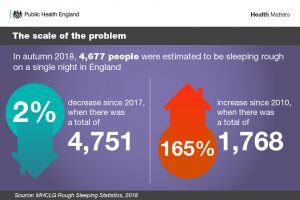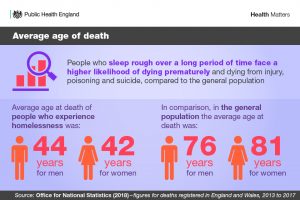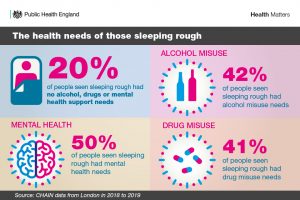
The latest edition of Health Matters, PHE’s professional resource, focuses on the scale of rough sleeping in England, the causes and consequences of rough sleeping (including the links with poor physical and mental health, prevention and effective interventions) and relevant calls to action.
This blog provides a summary of the full edition’s content.
The scale of rough sleeping in England
Since 2010, official estimated numbers of people who experience rough sleeping have creased by 165% to 4,677 people on a single night in England.

Rough sleeping is unevenly distributed across the country, with trends showing that it has increased in many different areas. The largest increases since 2010 have been in urban areas, with rural areas and some seaside towns seeing smaller increases.
In the 2018 counts and estimates, 84% of people experiencing rough sleeping were men, while 14% were women, and 80% were aged over 25 years.
People who experience rough sleeping over a long period, on average, face a higher likelihood of dying prematurely compared to the general population. The average age at death of people who experience homelessness was 44 years for men and 42 years for women, compared to 76 years for men and 81 years for women in the general population.

In 2017, over half of all deaths of people experiencing homelessness were due to 3 factors:
- accidents, including drug poisoning, accounted for 40%
- suicides accounted for 13%
- diseases of the liver accounted for 9%
A University College London study found that a third of deaths among people experiencing homelessness were due to conditions such as tuberculosis and gastric ulcers, which are amenable to timely and effective health care.
Physical and mental health needs
People who sleep rough experience some of the most severe health inequalities and report much poorer health than the general population. Many have co-occurring mental ill health and substance misuse needs, physical health needs, and have experienced significant trauma in their lives.

Ill-health can be both a cause and consequence of homelessness, although it is not always identified as the trigger of homelessness. For example, ill-health may contribute to job loss or relationship breakdown, which in turn can result in homelessness.
The poorer health outcomes that homeless people experience compared to the general population are related to:
- exposure to poor living conditions
- difficulty in maintaining personal hygiene
- poor diet
- high levels of stress
- drug and alcohol dependence
Access to primary care is also a major issue, with many people sleeping rough reporting being unable to register with a GP practice because they have no fixed address.
Evidence has also shown that, compared with the general population, common mental health conditions (such as depression, anxiety and panic disorder) are over twice as high among people who experience homelessness, and psychosis is up to 15 times as high. Of the people seen sleeping rough in London in 2017 to 2018, 50% reported mental health needs.
Substance dependence can also be both a cause and consequence of homelessness. Those who are dependent on drugs or alcohol may struggle to retain accommodation due to financial difficulties, problems with behaviour or family relationship breakdown. Homelessness can also be the route to substance dependence.
Call to action
The government’s Rough Sleeping Strategy, published in 2018, commits to halving rough sleeping by 2022 and ending it by 2027. The strategy states that achieving this ambition will require central and local government to work collaboratively and innovatively with business, communities, faith and voluntary groups and the general public.
Cross-government working is essential in preventing and relieving rough sleeping, as well as ensuring that ill health is not a cause of or barrier to, people moving away from rough sleeping. At a local level, leaders in health and social care systems have an important role to play in improving health outcomes and reducing health inequalities amongst people who are experiencing rough sleeping.
This edition of Health Matters collates existing resources, publications and data that can be used to inform actions to prevent and end rough sleeping.
Visit the Health Matters area of GOV.UK or sign up to receive the latest updates through our e-bulletin. If you found this blog helpful, you can read other Health Matters blogs here.
